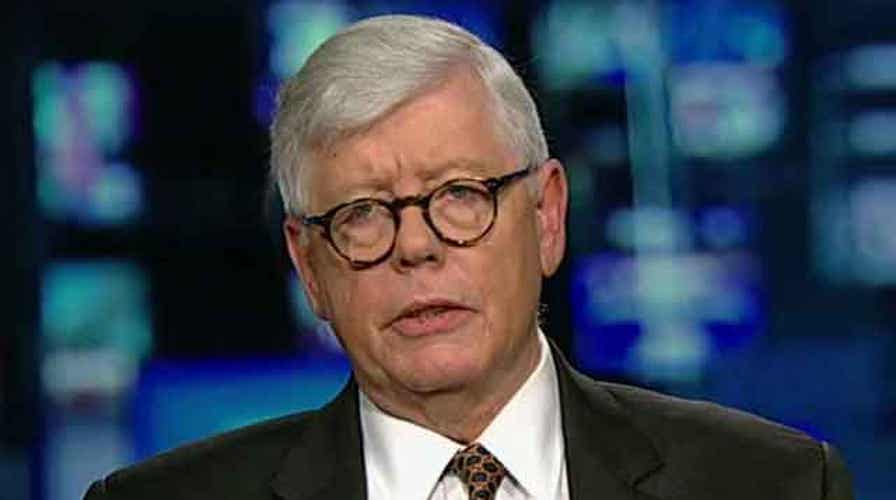NRA envisions 'fight of century' against gun control plans
President David Keene not surprised by 'anti-gun agenda,' says meeting with White House was 'all for show'
A few lines in President Obama's sprawling gun control plan are stirring accusations from conservatives that the administration is trying to enlist doctors in a national campaign against owning firearms.
The easy-to-miss language was part of Obama's package of executive actions and legislative proposals that includes a new assault-weapons ban and universal background checks. The provision on doctors, though, has begun to generate just as much controversy.
"The idea that your doctor would ask you if you have firearms in your house as part of an examination of your health is repugnant," National Rifle Association President David Keene told Fox News on Thursday, accusing the administration of trying to "demonize firearms" by implying that owning them is a "health problem."
One of the 23 executive actions Obama approved Wednesday was to "clarify" that the federal health care overhaul "does not prohibit doctors asking their patients about gun in their homes."
An overview of the plan said "we should never ask doctors and other health care providers to turn a blind eye to the risks posed by guns in the wrong hands."
Coupled with the language on asking patients about guns was a decision to "clarify" that no federal law prevents doctors from warning law enforcement about "direct and credible threats of violence."
The latter provision is actually in line with the policy of most states. All but a few allow mental health professionals to report information about patients they believe may become violent. Of them, most have laws requiring that information to be disclosed -- New York was one of the latest to update its law to mandate that doctors report when patients might pose a danger.
Conservative columnist and Fox News contributor Charles Krauthammer, who is a psychiatrist, said this language from Obama "doesn't change anything at all" -- he tried to assuage any concern about the provision.
But the line that appeared to encourage doctors to ask about guns in the home is what drew the ire of pro-gun rights lawmakers on Capitol Hill. They voiced concern that this could lead to doctors asking inappropriate and probing questions of their patients.
"President Obama has no business interjecting himself in the doctor-patient relationship by pressuring medical professionals to ask their patients what kind of guns they own in their homes. President Obama's latest executive orders give new meaning to the term 'house call,'" Rep. Steve Scalise, R-La., chairman of the Republican Study Committee, said in a statement.
Rep. John Fleming, R-La., himself a physician, accused Obama of "pushing the government further into the exam room."
"He's trying to press doctors into government service by pushing them to ask patients, even child patients, if there are guns in their home. After more than thirty years of operating a family practice, I can tell you it should not be the business of a family physician to take inventory of the guns in a patient's home," he said, noting that there are already laws ensuring that doctors warn authorities about criminal activity.
Still, despite Republicans' objections, the American Psychiatric Association has actually pushed for such a clarification from the administration.
"We are glad that the president has clarified that doctors are not prohibited from asking their patients about guns in their homes," the group said.
Howard Zonana, a professor in the Yale Department of Psychiatry, said that while it may be controversial for doctors in other fields to ask about firearms, it's virtually standard practice among psychiatrists.
"That is part and parcel of any suicide risk assessment," he told FoxNews.com. "That's standard psychiatric practice and negligent if you don't do it."
In most cases, he said, the psychiatrist would, if a patient acknowledges owning a gun, talk to that patient about it first. But, he said, if a patient is considered suicidal and not doing anything about his or her guns, "my threshold for having them hospitalized is going to be lower."
The administration argues that doctors "need to be able to ask about firearms" and how those firearms are stored, "especially if their patients show signs of certain mental illnesses" -- or if there's a young child or mentally ill family member at home.
Even Fleming acknowledged it's important "that people who are a known danger to others do not have access to guns." He just doesn't think it's a doctor's role.
The 2010 Affordable Care Act did include language meant to protect Second Amendment rights. Though it does not prohibit doctors from asking about firearms, the law states that the government cannot require that information to be disclosed either.
Further, the law said gun ownership cannot be used to determine insurance premium rates.





